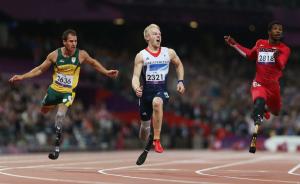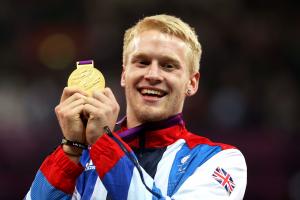Peacock shifting from London to Lyon
27.03.2013British Paralympic champion sprinter Jonnie Peacock now has the experience to back up his quest for gold at the 2013 IPC Athletics World Championships.
 Great Britain’s star sprinter Jonnie Peacock is ready to underline exactly why he has become one of the standard bearers for Paralympic athletics.
© • Getty Images
Great Britain’s star sprinter Jonnie Peacock is ready to underline exactly why he has become one of the standard bearers for Paralympic athletics.
© • Getty Images
 Gold medalist Jonnie Peacock of Great Britain poses on the podium during the victory ceremony for the Men's 100m - T44 at the London Paralympics
© • Getty Images
Gold medalist Jonnie Peacock of Great Britain poses on the podium during the victory ceremony for the Men's 100m - T44 at the London Paralympics
© • Getty Images
- Related News
- IPC reveals athletics Ones to Watch list for 2013 season
- Queen honours Paralymians and LOCOG employees in New Years Honours list
- British Paralympians inspire at Sports Fest
- Related Features
- No. 11: Jonnie Peacock raises bar in 100m T44
- Related Blogs
- Craig Spence: Peacock’s 100m win by far my 2012 highlight
- Gareth A Davies: A personal view of London 2012
“I am so competitive, I was so sure that I didn’t want anybody else to beat me in my home Games. I was a little bit nervous, but it was actually the most relaxed I have ever been for a race."
With the 2013 IPC Athletics World Championships in Lyon, France just months away, Great Britain’s star sprinter Jonnie Peacock is ready to underline exactly why he has become one of the standard bearers for Paralympic athletics.
Nearly seven months have passed since the Paralympic Games in London, where the youngster strode away from a star-studded field to claim his first Paralympic gold.
The IPC Athletics World Championships in July will be the first chance to see many of the gold medallists from London back in action together, including the current 100m T44 champion.
On 7 September 2012, as he entered the Olympic Park stadium to the resonating sound of his name being chanted by 80,000 people, little did Peacock know that he was mere moments away from international stardom.
But just 10.9 electrifying seconds later, he had suddenly become one of the faces of the Paralympic Games.
Over six months on from that unforgettable night, how does Peacock reflect upon his golden moment at his home Games?
“It all became kind of real when we were on the bus. When we arrived in the village and could see the stadium, that is when it really hit home that this was about to happen and this was the Games,” he said.
“The heats for me were more nerve wracking than the final, because I wasn’t sure where everyone else was at. I knew that a couple of them could be a lot quicker than they were.
“Come the final, I just wanted to go for it, get it done and I was ready. I felt really good in my warm up, did a couple of block starts and felt really good, it felt fast and I thought I was getting things right.
“When I was heading towards the stadium, it was lit up in purple or blue, and I said to Dan, my coach - this is mine, and nobody is going to be able to take it away from me tonight.
“I am so competitive, I was so sure that I didn’t want anybody else to beat me in my home Games. I was a little bit nervous, but it was actually the most relaxed I have ever been for a race.
“As I set my blocks up, it just felt right with the crowd going nuts and it just felt like my opportunity to do something now.
“I knew I had potential, but I knew that it was going to be tough and I would have to get a good start to be able to do anything.”
As the crowd waited in anticipation, the race start was delayed as Brazilian Alan Oliveira stumbled in the starting blocks.
Despite the break in concentration, the teenager believes it actually worked to his benefit.
Peacock said: “I was quite lucky for the false start as well, because I really didn’t feel like I had settled in my blocks as much as I had on the last go. But it was also quite nerve wracking. All it takes is a false start and there it goes, you just leave.”
At just 19 years old, it would have been excusable had Peacock crumbled under the pressure of the situation as he rubbed shoulders with his heroes.
But the world-record holder showed character far above his years to power through and rise to the top of the podium.
“I didn’t really feel too much pressure,” he said.
“Because I knew that no one was going to hate me if I lost. I knew that a lot of people were unsure if I could do it and had doubts that I was too young or didn’t have the experience.
“I knew that there were many excuses I could roll off if I didn’t win. If I messed up, I think it would have been forgivable. I don’t think you could talk to any athlete and they could say that they got a negative impact from the crowd.
“You felt so much support and love from the crowd, it wasn’t hate or pressure, it was just support. That was amazing and it just really settled me and just made it feel like it was my track.”





















